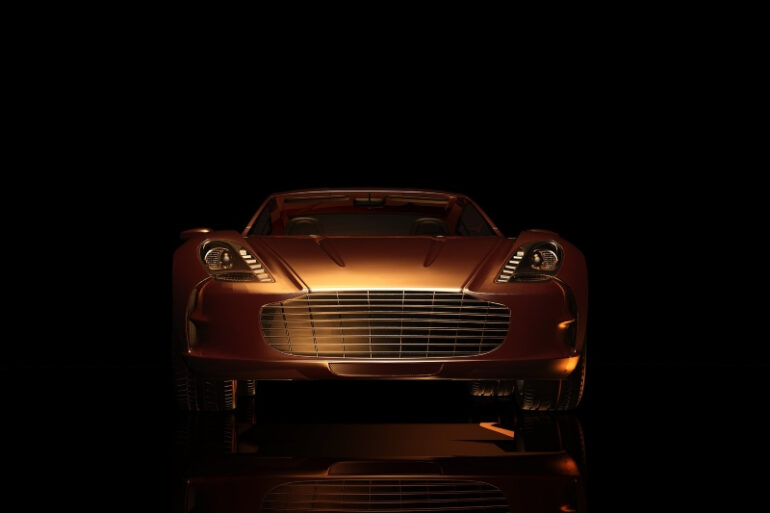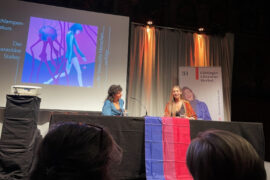After being implanted a titanium plate, Alexia develops a mysterious desire for cars. Julia Ducournau’s new movie Titane tells a strange story about the boundaries between body and object, but also about love and loneliness.
By Manni Li
Titane enabled Julia Ducournau to win the Palme d’Or in 2021. After Ducournau’s last film Raw disgusted some film critics and audiences for its repeated exposure of body horror, Titane still inherits the horror and grotesque genes of Raw. But this time, she expresses a wilder imagination of the body in this new film: a transformative and queer body. The topics behind the fancy combination of violence, horror, sex, cyberpunk and queerness are still love and loneliness. The film focuses on a young woman, Alexia (newcomer Agathe Rousselle), who gets titanium plates transplanted into her head after a car accident caused by her irritable father. After that, she shows a strong affinity with metal and cars. The adult Alexia works as a dancer at car shows, arousing men’s sexual desire for the female body and satisfying her secret desire for cars. Her destiny is entwined with the titanium implant.
Violently Subversive
There is a disturbing force in her body, which destroys her relationship with women and men, even family. She mercilessly pokes into the neck of a male fan who pursues her, she stabs a woman with whom she has sex, and she sets fire to her family, killing her parents. It seems that an uncontrolled force drives her to become a serial killer. Her motive for murder cannot be convincingly explained since it seems rather instinctual.
Titane
France/Belgium 2021
108 minutes
Director: Julia Ducournau
Starring: Agathe Rousselle, Vincent Lindon, and others
She shows a sort of bizarre coldness and hostility to the human, only the freaky pumping and rubbing with a masculine Cadillac with flame painting can resonate with her dormant sexual desire. The car sex is not only a subversive imagination of the relationship between body and object, but also a lethal attempt for Alexia. She gets pregnant by the car, her belly bulges out and black oil flows out from her breasts and vagina. Various signs of her pregnancy imply that her body is occupied by a mysterious power, and her lifetime starts to count down as she awaits the creature’s birth.
Alexia notices a computer-generated image of a missing boy called Adrien, and decides to masquerade as him. Adrien’s father Vincent (Vincent Lindon) accepts her as his son without any doubt or paternity-test. None of them are real. Vincent is not strong and optimistic as he seems, and Alexia is not the son expected to return.
Desire for Love
The plot in the first half is driven by the disturbing and dangerous force in Alexia’s body, in which she becomes a symbol of wildness; but the last half is centred on the interaction between this force and Vincent, the human-being. Vincent’s unconditional love and Alexia’s destructive force begin a silent gladiatorial fight. In the end, Alexia gives birth to a new species, a hybrid of human and automobile. As Vincent holds the new baby, all the horror, and violence settle down like dust and end up in a scene of displayed warmth. Ducournau explores and erases the boundaries of the body constantly in Titane. In this final scene, Vincent and Alexia, or a father and a son, or a man and a woman, are nakedly staying together, but it is not about sex or desire.
The representation of Alexia’s body leaves audiences panting for more. In Titane, the body does not just evoke horror, but becomes a complex and queer metaphor for loneliness. Both Vincent and Alexia are constantly changing their bodies to suit the needs of society, and at the same time, their bodies isolate them from others. Only when they are not in disguise, their souls can truly communicate.
The body of Alexia is not only queer but transformative: she is situated outside the heterosexual and homosexual institutions, but in a queer relation with an automobile. Initially, she has the potential to destroy everything. But under Vincent’s care, she gradually regains a sense of love and shows her true face. The violence, sex and weird titanium plates are just a disguise for Alexia’s body, under which she desires direct communication and unconditional love. As we see in the film, her relationship with Vincent cannot be defined with existing labels. Ducournau’s wild imaginations of the body are revolutionary and she sets out to explore and erase the boundaries between bodies as well as between body and object. And, more importantly, through such a wild fantasy, she tells a story about love.






